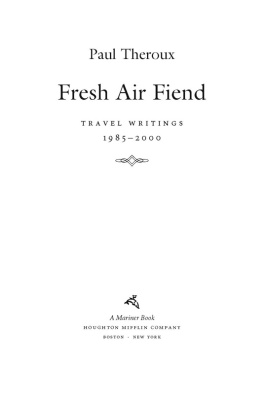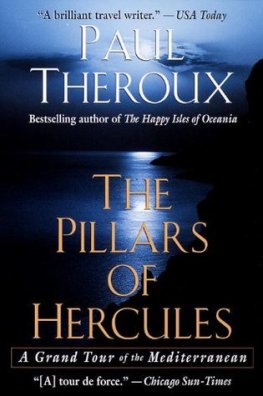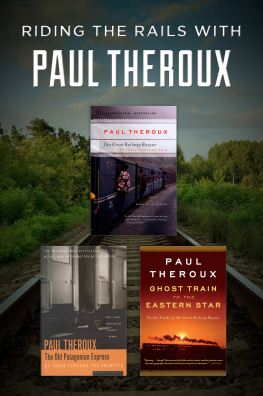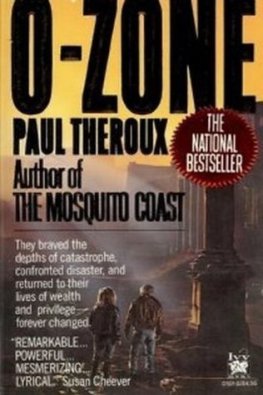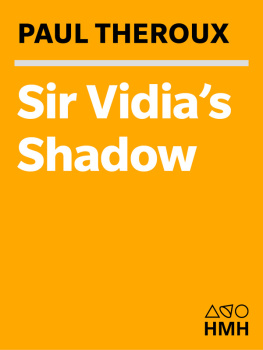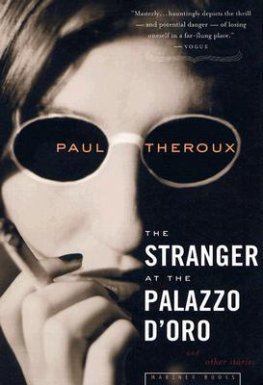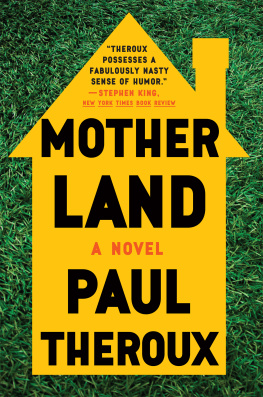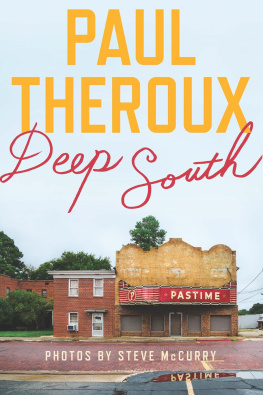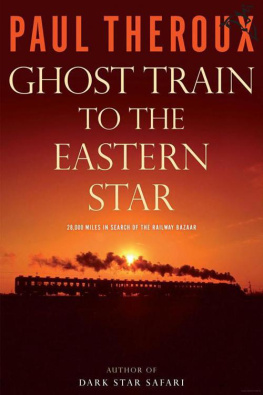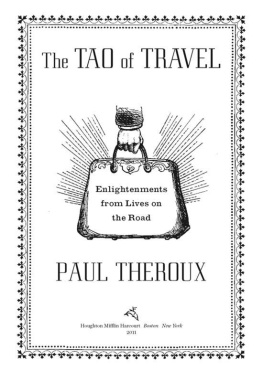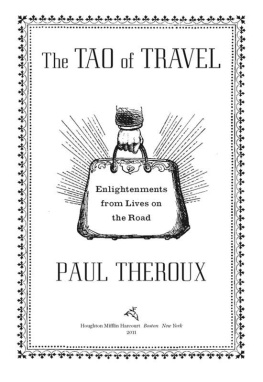First Mariner Books edition 2001
Copyright 2000 by Paul Theroux
All rights reserved
For information about permission to reproduce selections from this book, write to Permissions, Houghton Mifflin Company, 215 Park Avenue South, New York, New York 10003.
Visit our Web site: www.houghtonmifflinbooks.com.
Library of Congress Cataloging-in-Publication Data
Theroux, Paul.
Fresh air fiend : travel writings, 19852000 / Paul Theroux.
p. cm.
Includes bibliographical references (p. ).
ISBN 0-618-03406-4
ISBN 0-618-12693-7 (pbk.)
1. Theroux, PaulJourneys. 2. Voyages and travels.
I. Title
PS 3570. H 4 F 74 2000
818'.5403dc21 99-058521
Printed in the United States of America
Book design by Robert Overholtzer
QUM 10 9 8 7 6 5 4 3 2 1
The author is grateful for permission to reprint "The View" from Collected Poems by Philip Larkin. Copyright 1988, 1989 by the Estate of Philip Larkin. Reprinted by permission of Farrar, Straus and Giroux, LLC.
A man sets out to draw the world. As the years go by, he peoples a space with images of provinces, kingdoms, mountains, bays, ships, islands, fishes, rooms, instruments, stars, horses, and individuals. A short time before he dies, he discovers that the patient labyrinth of lines traces the lineaments of his own face.
Jorge Luis Borges, Epilogue, The Maker
Introduction: Being a Stranger
F OR LONG PERIODS of my life, living in places where I did not belong, I have been a perfect stranger. I asked myself whether my sense of otherness was the human condition. It certainly was my condition. As with most people, my outer life did not in the least resemble my inner life, but exotic places and circumstances intensified this difference. Sometimes my being a stranger was like the evocation of a dream state, at other times like a form of madness, and now and then it was just inconvenient. I might have gone home, except that a return home would have made me feel like a failure. I was not only far away, I was also out of touch. It sounds as though I am describing a metaphysical problem to which there was no solutionbut no, all of this was a form of salvation.
I was an outsider before I was a traveler; I was a traveler before I was a writer; I think one led to the other. I don't think I was ever a scholar or a student in the formal sense. When I mentioned this notion of being a stranger to my friend Oliver Sacks, he said, "In the Kabala the first act in the creation of the universe is exile." That makes sense to me.
Exile is a large concept for which a smaller version, the one I chose, is expatriation. I simply went away. Raised in a large, talkative, teasing family of seven children, I yearned for space of my own. One of my pleasures was reading; reading was a refuge and an indulgence. But my greatest pleasure lay in leaving my crowded house and going for all-day hikes. In time these hikes turned into camping trips. Fortunately our house was at the edge of town, so I could go out the front door and after half a mile of walking be in the woods, attractively named the Mystic Fells. On my own, I had a clearer sense of who I was, and I had a serious curiosity about what I found in the woods. The taxonomy of the trees and flowers and birds was a new language I learned in this new world.
When I went to Africa, a young man and unpublished, I became a mzungu, or white man, but the Chichewa word also implies a spirit, a ghost figure, almost a goblin, a being so marginal as to be barely human. I did not find it at all hard to accept this definition; I had always felt fairly marginal, with something to prove. So, speaking about myself as a traveler is the most logical way of speaking about myself as a writer.
As for my apprenticeship as a writer, I am sure that my single-mind-edness was helped by my being out of touch. Both ideasbeing a stranger, being out of touchseem to me to be related. I believed myself a stranger wherever I waseven when I was younger and among my family at homeand for much of my life I have felt disconnected. You think of a writer as in touch and at the center of things, but I have found the opposite to be the case.
A variation of this concept was once a great topic in colleges. When I was a student it was the obsessive subjectthe alienated hero or anti-hero, the drifter, epitomized by the figure of the casual and detached murderer Meursault in Camus's L'tranger, or Raskolnikov in Crime and Punishment, or the trapped and ineffectual Josef K. in Kafka's The Trial, who is a total stranger to the process that is for no apparent reason blaming and victimizing him. There seemed to me something freakish about these men and something formulaic about their predicament. I found these characters and this discussion less persuasive because the characters seemed like stock figures in a morality play. I could not identify with
I, a stranger and afraid
In a world I nevermade.
I have been much more affected when an apparently whole, rounded character described a sense of loss or deep isolation. It is no surprise when the hero of a postwar French novel is said to be alienated, but how much more powerful when the anguish is that of someone instantly recognizable, like Nicole Diver in Fitzgerald's Tender Is the Night, or Peyton Loftis in William Styron's Lie Down in Darkness, or the "whiskey priest" in Greene's The Power and the Glory. It is almost a shock when one of the great serene masters of the novel speaks of alienation, as these three men have doneFitzgerald on alcohol in The Crack-Up, Greene on manic-depression in A Sort of Life, and Styron on suicidal depression in Darkness Visible. Even Henry James, the intensely sociable and inexhaustible dinner guest, experienced several breakdowns and many depressions. Jorge Luis Borges wrote, "I speak in a poem of the ancient food of heroes: humiliation, unhappiness, discord. Those things are given to us to transform, so that we may make from the miserable circumstances of our lives things that are eternal, or aspire to be so."
There are few more explicit descriptions of the pain of isolation than that confided by James in a letter to a friend, who had asked mildly, using a travel metaphor, what had been his point of departurewhat "port" had he set out from to become a writer. James replied: "The port from which I set out was, I think, that of the essential loneliness of my lifeand it seems to be the port also, in sooth, to which my course again finally directs itself! This loneliness (since I mention it!)what is it still but the deepest thing about one? Deeper, about me, at any rate, than anything else; deeper than my 'genius,' deeper than my 'discipline,' deeper than my pride, deeper, above all, than the deep counterminings of art."
The English writer V. S. Pritchett spoke about this condition of otherness in his autobiography, how it was not until he began to travel far from his home in south London that he began to understand himself and his literary vocation. He said that he found distant places so congenial that he became an outsider at home. Travel had transformed him into a stranger. He wrote, "I became a foreigner. For myself, that is what a writer isa man living on the other side of a frontier."
For various reasons, it is now not so easy to be a foreigner (I am using the word in a general sense). Yet it was very easy for me less than forty years ago, when I was an impressionable teenager and amateur emigrant. Then, a person could simply disappear by traveling; even a trip to Europe involved a sort of obscurity. A trip to Africa or South America could be a vanishing into silence and darkness.
The idea of disappearance appealed to me. For about ten years, the whole decade of my twenties, I was utterly out of touch. I went to central Africa in 1963 and stayed for five years, and then instead of heading home I went to Singapore, from which I emerged late in 1971. At that point I buried myself and my family in the depths of the English countryside, nowhere near a village. During this entire period, living frugally, I did not own a telephone, and the few calls I made were all in the nature of emergenciesreporting births and deaths, summoning doctors, all on borrowed phones. This decade of being off the phone, which is the most extreme condition of being cut off, was formative for me, one of the best things that could have happened in my passage to becoming a writer, because it forced on me a narrow sort of life from which there was no turning back. I was isolated and enlightened. I learned to cope, I read more, I wrote more, I had no TV, I thought in a more concentrated way, I lived in one place, and I studied patience.
Next page
